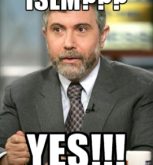from Dean Baker It will be hard to decide the most Trumpian moment in his dealing with the coronavirus pandemic, but my nomination is Trump’s meeting with executives from several pharmaceutical companies, where he discussed developing a vaccine. According to Trump, he asked them to “speed it up,” and they said that they would. The idea that Trump’s admonition to hasten the development of a vaccine would have any impact on these companies’ efforts is too loony to envision for anyone...
Read More »Open thread March 13, 2020
Is a Zero Growth Economy Viable?
The present pandemic demonstrates that the global economy is closely tied to consumer spending. Suppose the pandemic is merely a foretaste of the effects of climate change and ecological destruction. Can we fashion a world base on Zero Growth, a Steady State Economy? Zero growth might well entail the following: 1. A fixed and renewal body of resources. 2. A demographic balance, i.e., a fixed population size. Can such an economy enable all of humanity...
Read More »Coronavirus and capitalism’s vulnerability
from C. P. Chandrasekhar Even while the slow growth that followed the Great Recession endures, the world economy is staring at another recession. The OECD Secretariat has reduced its forecast of global GDP growth by half a percentage point to 2.4 per cent, which is the lowest since the global financial crisis. The immediate trigger is the coronavirus epidemic that is disrupting global economic activity. But there is a larger message being sent out by the virus onslaught. The damage that...
Read More »How Low Can You Go?
This is not a prediction. Only an observation. From 1952 to 1996, U.S. nominal net worth of households and non-profits tracked nominal GDP pretty closely. Net worth remained pretty close to 15 times GDP. That consistent relationship ended after 1997. In the third quarter of 2007, net worth was nearly 20 times GDP but by the second quarter of 2009 it had reverted to just 17 times GDP. One might argue that it was roughly 15 times what trend GDP would have...
Read More »The Keynes/Hicks macro theory — the nonexistence of a New Keynesian unicorn
from Lars Syll Paul Krugman has on numerous occasions tried to defend “the whole enterprise of Keynes/Hicks macroeconomic theory” and especially his own somewhat idiosyncratic version of IS-LM. The main problem, however, is that there is no such thing as a Keynes/Hicks macroeconomic theory! So, let us get some things straight. There is nothing in the post-General Theory writings of Keynes that suggests him considering Hicks’s IS-LM anywhere near a faithful rendering of his thought. In...
Read More »How many times do the drug companies have to be paid for their research?
from Dean Baker That’s what readers of this Politico piece on efforts to restrict patent monopoly pricing of a coronavirus vaccine as a quid pro quo for government funding must be wondering. One might think that if the taxpayers put up money for the research then they have already paid for it, and therefore no patent monopolies would be involved. The vaccine would sell as a cheap generic and drug companies would make profits from it in the same way that manufacturers of paper clips and...
Read More »GDP comparisons across time
from Asad Zaman This continues a sequence of posts aiming to show how apparently objective statistics conceal large numbers of arbitrary value judgements. (1) Lies, Damned Lies, and Statistics, (2) Subjectivity Concealed in Index Numbers, (3) The Values of a Market Society, (4) Cross-Country Comparisons of Wealth, (5) Purchasing Power Parity, (6) Downfall of Rhetoric in 20th Century, (7) Facts & Values: Distinction or Dichotomy?. This is the 8th post, which considers comparisons of...
Read More »Open thread March 10, 2020
Personal report from Italy
My brother lives in Lucca, Italy ( near Florence) and sent the following report. We’re not quite at the “Bring Our Your Dead” stage. Schools & museums are closed, flights are being canceled, but all in all life in Lucca is quiet & normal. Many shops are closed for their usual breaks this time of year. There are virtually no tourists, but this is the slow season. Nancy just spent the weekend in Florence and found it to be delightfully empty....
Read More » Heterodox
Heterodox


